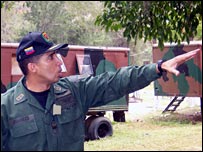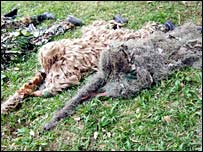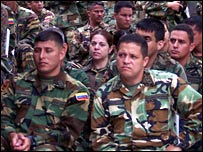Untitled Document
We have received word from Venezuela that television news reports that President
Chávez has called upon all towns and villages "to organize themselves
to obtain military training against any invader". The guerilla training
taking place in Venezuela at this time is a direct response to the increasing
threats, born and bred in Washington as the empire prepares for the December,
2006 presidential elections. Foreign
Policy Magazine has listed President Chávez among the world's
"Marked Men". He is pictured along with Hamid Karzai (Afghanistan),
Ayatollah Ali Sistani (Iraq), President Pervez Musharraf (Pakistan) - pictured
below with President Chávez. They state their reason for naming President
Chávez as a "marked man":
"Chávez’s long list of enemies includes the Bush administration,
many Latin American leaders, and televangelist Pat Robertson. They loathe
Chávez for embracing such groups as Colombia’s FARC rebels and
his gratuitous anti-Americanism."
Foreign Policy Magazine then advances an opinion about who would assassinate
President Chavez:
"Rogue factions of the military, which Chávez purged in 2002.
Or a member of the former regime (some of whom now reside in Miami). In any
case, the United States would be blamed."
This appears to be an attempt by Foreign Policy Magazine in cooperation
with the U.S. government to absolve the United States of any complicity should
another attempt on Chávez' life be made.
Foreign Policy Magazine is published by the Carnegie Endowment for
International Peace (CEIP) out of Washington D.C. which explains the choice
of "Marked Men" as seen from a neocon perspective. An Iraqi perspective
could well produce a different list.
Below is the depiction of Foreign Policy Magazine's "Marked Men"
and our conclusion:
--------------------------------------------------------------------------------
The World’s
Marked Men
By Daniel Byman
Assassinations have sparked major upheavals throughout history. FP
looks at leaders who are at risk today, and what might follow if they fall.
___________________________
In an article I wrote on January 11, 2005 I identified the domain/source of
a letter written by a member of the opposition in Venezuela - one Gustavo Coronel.
Coronel wrote the letter from the domain of The Carnegie Endowment for International
Peace (CEIP). In that investigation, I discovered that CEIP publishes Foreign
Policy Magazine. Moises Naim is Editor in Chief of FP magazine. What follows
is an excerpt from my January 11, 2005 report:
Our research shows that Mr. Coronel wrote to us from the domain of The
Carnegie Endowment for International Peace.- gcoronel@ceip.org - and works
in service to this U.S. institution. The CEIP publishes Foreign Policy
Magazine (FPM), one of the world's leading magazines of international
politics and economics which reaches readers in more than 120 countries and
several languages. Moises
Naim is Editor and Publisher of FPM and is also one of the six
members of Time Magazine’s International Board of Economists.
Based upon information obtained today by Axis of Logic, it appears that Mr.
Coronel, obtained his job from Mr. Naim. Mr. Coronel claims to be a resident
of Venezuela 90% of his time, but also works in opposition to the Venezuelan
government and is funded by this U.S. institution in Washington, D.C. Also,
it is not lost on us that Venezuela is among the top 4 oil producers in the
world and has fallen in disfavor with the U.S. government.
The Carnegie Endowment for International Peace operates very much
like the National
Endowment for Democracy, another Washington-based organization that was
heavily involved with the attempted overthrow of the government in Venezuela
in April, 2002.
Currently, CEIP
is promoting U.S. interference in the internal affairs of Iran. CEIP's Vice
President of Studies, George Perkovich supports a Pierre Goldschmidt's article,
The
Security Council Must Curb Iran’s Nukes. in which Goldschmidt argues,
"The United Nations Security Council should adopt a generic and binding
resolution that would automatically authorize three steps if a state is found
in non-compliance by the IAEA." On the one hand, Joseph Cirincione,
CEIP's Director for Nonproliferation dutifully criticizes "neocon foreign
policy" and writes that Israel and the U.S. have No
Military Options with respect to Iran. On the other hand his arguments for
rejecting a military strike against Iran are purely based on pragmatics rather
than the legitimacy or morality of another unprovoked, unilateral invasion.
For example, writing about Israel's 1981 raid on Iraq's nuclear facility, Cirincione
complained: "The raid had not, despite Cheney's praise, made 'our job
much easier' but had complicated an already difficult problem."
The CEIP, NED and their funding sources attempt obfuscate a few basic principles
that have guided and provided stability for international relations for over
400 years: The right of every nation to self-determination; the right of national
sovereignty and the right to defend itself against foreign interference in its
domestic affairs. These over-funded, morally bankrupt, unaccountable "think
tanks" drown these simple time-worn principles with layers of complexity
and fear-mongering. Their strategy and tactics vary little from one target country
to another or from one decade to another. They and the U.S. government have
doggedly attempted create
fear and confusion inside Venezuela and about the Bolivarian Republic for
the last 8 years.
Eva Golinger, a New York attorney who uncovered NED's complicity in the 2002
coup attempt against Chávez, wrote about NED's
use of tax funds for interference in Venezuela and Haiti:
"NED is funded annually by grants from the US Congress and State Department,
with a 2006 global budget of $80 million, an increase of $20 million from
2005. For years the group has played a controversial role-with lopsided funding
of elections in foreign countries-in promoting pro-US candidates and policies
friendly to US interests. Most recently, the NED has been accused of attempting
to destabilize the Venezuelan government."
Of one thing we can be certain. After all it's failures in attempted assassinations,
attempts to beat Chávez in democratic elections in Venezuela and it's
most recent rigging (by opposition abstentia) of the December National Elections
in Venezuela - the U.S. is going to attempt to overthrow the duly elected president
of Venezuela in the upcoming December, 2006 elections - by any means necessary.
- Les Blough, Editor
--------------------------------------------------------------------------------
Venezuela trains for guerrilla war
By Greg Morsbach
BBC News, Venezuela
March 6, 2006
Assassinations have sparked major upheavals throughout history. FP looks at
leaders who are at risk today, and what might follow if they fall.
Under the blazing midday sun, at an army base outside Caracas, middle-aged
Venezuelan military commanders were being told how to teach the civilian population
in guerrilla warfare.
 |
|
[Photo - Lt Col Antonio Benavides is training officials to instruct reservists]
|
Hundreds of officers in olive combat dress were shown practical displays of Venezuela's
new military thinking: The use of civilians to fight a war of resistance in the
event of an invasion.
They are now using this knowledge to train around 2m civilians to become military
reservists.
The first half-a-million adults are already being put through the four-month
programme. The rest are expected follow over the coming months.
Lt Col Antonio Benavides, of the elite National Guard commando regiment, is
responsible for training many of the military professionals who will in turn
instruct the reservists.
Lt Col Benavides started the first lesson of the day: The art of camouflage.
"Here we have a hidden underground tunnel system like the Vietcong used
in Vietnam against the American aggressors," he said, pointing to the entrance
of a dark hole in the ground.
Anything will do, as long as it harms the enemy". - Rear
Admiral
Luis Cabrera Aguirre
"This is the kind of tunnel that we're now teaching civilians to build."
Lt Col Benavides lined up a small group of civilian reservists to make a point
about the art of surprise in guerrilla warfare.
"On the surface they look like ordinary people on the street. But if you
look underneath their jackets, you will see they are hiding knifes, catapults
and pistols," he told his audience.
"We're not expecting to arm all our reservists with guns. We do want them
to make their own home-made weapons. Anything will do, as long as it harms the
enemy," said retired Rear Admiral Luis Cabrera Aguirre, who is overseeing
the training given to civilian volunteers.
'Deterrent'
It is this kind of territorial guard made up of civilians, President Hugo Chavez
of Venezuela is now creating with the help of military drill, weapons training
and lessons in citizenship.
President Chavez wants the territorial guard to act as a deterrent for any
potential invasion of Venezuela.
 |
|
[Photo - Art of camouflage - the first lesson of the day]
|
In his test weekly TV show, President Chavez repeated his long-held belief that
the US was planning to invade Venezuela, saying that Washington wanted to overthrow
him.
General Juan Alberto Hernandez, of the National Guard, told the BBC that a
group of Venezuelan officers had taken part in a large-scale military exercise
in Cuba.
"They reported back to us that they were impressed with what they saw.
Cuba's civilian population was working hand in hand with the professional army
to defend the country. This is a lesson we are learning from Cuba."
The concept of a civilian militia is nothing new in Venezuela. Almost half
a year ago, small neighbourhood groups of Chavez supporters began holding informal
gatherings on a weekly basis. The meetings were limited to military drill.
But the idea has come a long way since. More than 2m adults have signed up
to become reservists in a programme run by the armed forces and are now having
to give up a Saturday each week.
'Instrument of repression'
At an office inside the headquarters of Venezuela state owned oil company,
PDVSA, Alfredo Carquez reflects on his experiences as a new recruit for the
territorial guard.
"At first my family wasn't too impressed that when I signed up,"
said Mr Carquez, a 43-year-old executive who works for the firm.
"But they have accepted it now because I explained to them that I feel
obliged to defend my fatherland and any threat to the revolutionary process
being carried out by President Chavez."
Mr Carquez and many others like him feel they are privileged to work for the
government in relatively secure and well-paid jobs. So they feel they want to
put something back into the system.
 |
|
[Photo - Venezuelans are being trained in guerrilla warfare]
|
But it is not just government employees who have become trainees in the reserve.
A whole cross-section of society including housewives and pensioners has come
forward to serve in the territorial guard.
However, former military officers close to the opposition warn that the territorial
guard could be used to quash popular dissent against President Chavez.
Retired Vice Admiral Mario Ivan Carratu Molina said: "Remember that the
territorial guard is directly answerable to the president. So he could use it
as an instrument of repression against a popular uprising, for example."
There is currently a debate in Venezuela's parliament whether service in the
reserve should be made compulsory for all Venezuelans.
Several high-ranking military officers have told the BBC they are reluctant
to force citizens into military service.
However, a group of pro-Chavez lawmakers argues that the country needs a well-trained
reserve force and that making it compulsory is the only way to make that happen.
http://news.bbc.co.uk/2/hi/americas/4777972.stm

